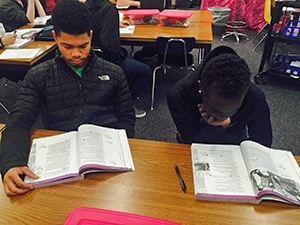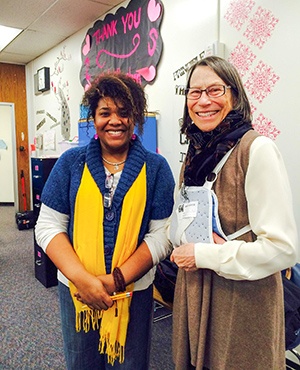 How One Teacher is Working Her Magic to Help Struggling Students Reclaim Their Education, Part 1 of 2
How One Teacher is Working Her Magic to Help Struggling Students Reclaim Their Education, Part 1 of 2
Things are moving fast these days in this magical universe. It’s been raining pink glitter ever since I published my first blog post. I’ve been moving quickly from dream to idea to plan to action. Recently, I turned my attention to at-risk students on my roster.
A problem that has always perplexed me (and many of my colleagues) is when students fall through the cracks year after year. The names change, but the basic M.O. is the same: lacks foundational skills, a rap sheet of petty trouble, attends school just long enough to be suspended again, generally disengaged … but bright. That’s what continually stumps me; they are always so incredibly intelligent!
My heart breaks for them. Each year, I wonder what happened that led them to squander their education so carelessly. How is it that these students struggle year after year, and we haven’t figured out what they need to become successful? Why are these kids being forced to conform to a system that isn’t working for them? Doesn’t their repeated failure indicate that it’s time to take a different approach?
Like any great educator, I spend a lot of time refining my craft. I review the needs of my students and adjust my approach to maximize learning. Responding to the needs of a variety of learners every day keeps one on one’s toes. Lesson by lesson, I’m upping my game for a new savvy set of scholars.
I know all the arguments about how much home life and society contribute to a student’s academic success. I get it. Bottom line is, I have to figure out how to address these shortcomings that exist outside of school because they present themselves in my classroom. I’m over the blame game; I’m in teacher mode! However, solving this problem is easier said than done …
Where to Start
Lham (pictured above) came to me well after the school year started. He had transferred from another school in the area. He was charming, respectful, and brandishing transfer grades that make those who hold education dear cringe. From day one, I knew he was a student who was struggling to thrive in this system. I’m pretty certain he’s a genius, yet he landed in my literacy intervention class.
He would come to class extremely tardy or, more likely, would skip class altogether. He was underprepared; besides lacking a pencil, he was perpetually catching up from being gone. I could see the frustration on his face. He was paying the price for his poor choices. Fair is fair, right?
Wait. I am the teacher who makes magic. I support kids; I don’t crush them. Most importantly, he is 14 years old. Before he met me, when he was even younger, other people tried to teach him the same lessons about choices and consequences. They failed. If the adults haven’t learned to approach the problem differently, how can I expect Lham, who has decades less life experience and maturity than I, to learn through the same ineffective disciplines used in the past? We were all missing the mark.
Importantly, I had forgotten part of my teaching philosophy: discipline should decrease the likelihood of the behavior reoccurring while empowering the person to make better decisions in the future. Blindly issuing stock consequences simply as a reaction to an offense is punishment. Since when did teachers become punitive, soul-crushing educational wardens?
 I was punishing Lham and others like him for trying, in their own way, to improve. They tried to take their medicine and found it too painful. Rather than help them find ways to face the challenge, I kept offering and allowing more doses to stack up in front of them, untouched. That doesn’t sound very compassionate at all when viewed through a different metaphor. How was I really helping Lham, his learning buddy, Matthias (pictured together here), and others like them?
I was punishing Lham and others like him for trying, in their own way, to improve. They tried to take their medicine and found it too painful. Rather than help them find ways to face the challenge, I kept offering and allowing more doses to stack up in front of them, untouched. That doesn’t sound very compassionate at all when viewed through a different metaphor. How was I really helping Lham, his learning buddy, Matthias (pictured together here), and others like them?
He was not about to become the poster boy for at-risk kids lost in the system. Not on my watch.
'I Got You'
I did a drag net of my roster. I made a list of students like Lham. I clicked on their record in our database to check grades in other classes and e-mailed teachers about any possible behavioral concerns.
It was just as I suspected.
These students were often suspended or just plain absent. They weren’t prepared for class. They lacked skills. They were good kids, but no one knew how to light that spark. I also noted they weren’t connected to anything positive in our school—not a club, sport, teacher mentor, good student friend, or activity. They came to school and felt the burn of being lost in a lesson. Teachers and students met them with frustration for a variety of reasons. No doubt, school was a very hard place for these students to be. Yet at some point, they kept coming back. I am big on starting with whatever positive I can grasp—that’s where the magic starts—and making more from there.
I decided I was going to make these students their own support system by way of intentional connections. I put Lham’s name and every kid on my roster like him on a list. It was time for them to rise up and behave like the ladies and gentlemen they are.
I spoke with Lham’s other teachers. They knew the same thing: Lham was sharp, but he was floundering. I started to seek Lham out. I said “hi” to him in the hallway. I fussed over him when he came to class. I provided pencils. I told him I understood how confused he was because he’d been gone. I let him know I wanted him to keep trying.
One day after Lham arrived 30 or so minutes late to class (a typical occurrence, usually sans a good explanation), I had a serious long talk with him in the hallway. In no uncertain terms I told him how much I personally care about him and his education. I told him about the potential I and others see in him. I pointedly listed off the many ways he is failing to make good decisions. Then, I told him that I was pulling out all the stops to shore him up until he could support himself because he was too important to this world to let slip.
I told him I had been thinking a lot about him, and the incredible gift of a mind he was wasting.
“Do you love your parents?” I asked Lham. He looked confused. I repeated the question.
“Of course!” he responded, dazed.
“Do you want to be in a position to help them if they needed you?” I questioned. He nodded his head as if it were a no-brainer.
My voice became very low, and I became teary. “Honey, with these grades, you won’t even be able to take care of yourself. You’re better than this. How you are behaving in this world right now is saying, ‘I don’t care about my family, I don’t care about my community, I don’t care about you, and I for dang sure don’t even care about myself.’ ”
Lham hung his head.
Unnerved and irritated by the genius that stood before me wasting, I asked, “Are you seriously ready to do better? I mean, like, make changes. And think about this carefully before you answer, because I don’t tolerate liars.”
He slowly but earnestly said yes. I extended my hand and shook his. I told him that he was going to turn this around. It wouldn’t be easy, but he could do it. I would help him.
“You will slip, but you must always remember to get up, accept responsibility, and continue to move forward. Do you understand?” I asked Lham with a smile. The serious air was changing to one of hope.
I asked, “Who’s got you, Lham?”
He paused before responding, then looked up at me as the epiphany registered on his face and said, “You do!”
“That’s exactly right,” I told him. “I got you … until you got you!”
Always Move Forward
The very next period, I passed Lham at the tardy station getting a late ticket into class. I read him the riot act and let him know that I was extremely disappointed. He had to do better. In fact, to be in my group and get on the right track, he’d need to do a heck of a lot better, and that was the last tardy.
I received a report from Lham’s teacher that period indicating that he looked a little shaken and solemn. I was neither surprised nor apologetic; Lham had to do better.
His education, the foundation for the big life he will lead, depended on his ability to honor his commitments to himself and others.
The next day, first thing in the morning, I saw him at school—on time. I lit up when I saw him, and he flashed a brilliant smile back. I told him I expected him to make it on time to his first class and to my second period on time. He gave me the thumbs up. That day, for the first time since he first arrived at our school, he made it to all of his classes on time.
morning, I saw him at school—on time. I lit up when I saw him, and he flashed a brilliant smile back. I told him I expected him to make it on time to his first class and to my second period on time. He gave me the thumbs up. That day, for the first time since he first arrived at our school, he made it to all of his classes on time.
Lham was able to salvage his grades in many of his classes through communication and the cooperative effort of his teachers. He is looking forward to joining the basketball team on a probationary basis. Last week, I had the privilege of introducing to Lham and my other students the driving force behind LANGUAGE! Live, the literacy intervention our school is using. Meeting Dr. Louisa Moats and having her observe my class was not unlike meeting one of your favorite rock stars and being asked to sing their No. 1 hit tune for them in your PJs. I can't even begin to describe the incredible magic shared between us (pictured here).
Because of Lham, my school now has two groups to better support at-risk students. Learn more about them next week in Part 2 of this blog. Thanks for helping make magic happen for every student who needs it!
To watch videos of the success stories Antavia's school is having with the blended literacy intervention LANGUAGE! Live, click on the button below.
Do you have questions or your own tips for motivating adolescent readers? Please share your thoughts in the comment field below.



